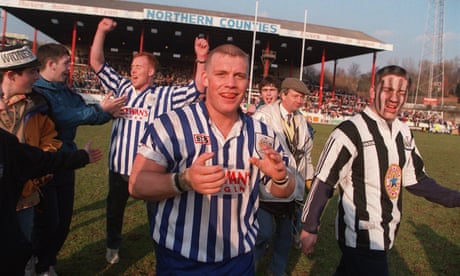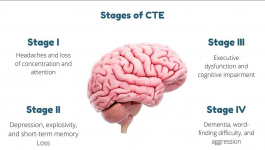r00fie1
Well-known member
Another annoying trend sneaking into football, defenders needing treatment after heading the ball Another form of cheating as ref has to stop the match.

Headway welcomes new research into effects of heading the ball
Headway – the brain injury association has welcomed a new study investigating the long-term impact of heading a football on the brain but believes there’s still more to be done.

The four-year BrainHOPE study will work with 120 ex-professional footballers aged between 40-59 to look into ways of reducing the risk of repeated head trauma and subsequent disease.
The £1.3m project is being led by respected expert Dr Willie Stewart who is a consultant neuropathologist at the University of Glasgow, and is jointly funded by the FA and FIFA.
“It’s positive to see football finally putting its hand in its pocket to pay for this excellent research, but it has taken far too long to get to this point,” said Peter McCabe, Chief Executive of Headway.
“And whilst this is a helpful step forward, we hope that it will not be four years before the next funding announcement.
“More money needs to be pledged, and more research undertaken, so that a wider body of evidence from a range of researchers can provide a real consensus as to what damage is being done to the brain everytime someone heads the ball.
“At Headway, we know the benefits of sport and staying active, and it’s very important to our wellbeing, but we also cannot wait for another four years to see the extent to which players – from Sunday league to the global elite – may be putting themselves at risk.
“We look forward to seeing how the BrainHOPE study progresses but hope in the meantime more researchers, academics and funders come forward to make brain health in football a priority.”
-------------------------------------------------------------------------------------------------------------------------------------------------------------------------------------------------------------------

Keith Pontin died of dementia caused by head trauma, inquest finds
The Wales defender died in 2020, aged 64, after playing more than 200 games, with his family now campaigning for a better understanding of dementia among players
Keith Pontin died of dementia caused by head trauma, inquest finds

- Former Cardiff and Wales defender died in 2020 aged 64
- More than 200 league appearances made during career
Tue 3 May 2022 20.26 BSTLast modified on Tue 3 May 2022 23.04 BST
The former Wales defender Keith Pontin died from dementia caused by repeated trauma to the head during his long playing career, an inquest has found.
Pontin played for Cardiff between 1976 and 1983 and made more than 200 league appearances as well as being capped twice by Wales.


More than 400 ex-rugby players died early from brain injuries, claim lawyers

He was diagnosed with early onset dementia in 2015 aged 59, and died at the Royal Glamorgan Hospital on 2 August 2020 aged 64.
His family, including his wife Janet – who has campaigned for a better understanding of dementia among players – and his two grown-up daughters, have always believed his condition was linked to years of sustaining multiple concussions during matches.
Pontypridd coroner’s court heard on Tuesday that a post-mortem examination carried out on Pontin by the pathologist Dr Esther Youd found the cause of death to be chronic traumatic encephalopathy (CTE).

William Stewart, consultant neuropathologist at Glasgow’s Queen Elizabeth University Hospital, who examined Pontin’s brain tissue, said: “The overwhelming pathology was of chronic traumatic encephalopathy.”
CTE is a progressive brain condition believed to be caused by repeated blows to the head and episodes of concussion. The symptoms of CTE affect the functioning of the brain and eventually lead to dementia.
During the hearing, a list of the injuries Pontin suffered throughout his career, compiled by his wife, was read to the court – beginning with a concussion during a match against Wrexham when he was playing for Cardiff aged 18.
Another incident saw him collide with Sam Allardyce during a game, causing him to need stitches to an eye. Other incidents noted injuries including cuts to his face, blows to his head, a broken nose and a back injury.
The assistant coroner David Regan said a number of statements described Pontin as a “gentle giant off the field” but a “competitive” footballer with a “combative” style.
Paul Burrows, a former Swansea player and teammate of Pontin’s at Barry Town, said Pontin was “expected to be dominant in the air and good at heading the ball” and added: “There was a time when he came back on the field with his head bandaged up with blood everywhere. Everyone thought that was great at the time, he was a hero sort of thing.
“Now there’s a lot more emphasis on checking out the head injuries. But back then if the player said he was fine, he would go back on the field.”
Another witness, David Cole from Barry Town – where Pontin played before he retired in 1991 – said of the game at the time: “It was a ‘men are men’ kind of attitude. If you went in for a ball and got hurt you just got on with it.”
Stewart gave evidence over video link and said he found a pattern of Tau protein in Pontin’s brain consistent with CTE, and that after collecting a history from Pontin’s wife believed it could only have been caused by his playing career.
“What comes through particularly strongly is the behavioural changes which were unlike him in terms of episodes of aggression and challenging behaviour,” he said. “All of it fits quite strongly with the current understanding of CTE.
“Dementia is a very loose term for a degenerative brain process, it’s an imprecise term. The precise term in this case is CTE. That is the precise term for his dementia.”
He said about 75% of former footballers and rugby players with dementia have CTE and former footballers are three and a half times more likely to develop CTE later in life, with the risk jumping to a five-fold chance for defenders.
“There is no evidence yet suggesting changes in the modern game have altered the risk,” he said.
A legal representative for Cardiff attended the inquest and questioned Stewart over his findings, claiming there was not enough evidence to prove Pontin’s career in football had caused CTE.
However, Regan said he found Stewart “extremely persuasive” and concluded: “Keith Pontin died from chronic traumatic encephalopathy caused by repetitive head injury suffered as a professional footballer.”
The former Wales defender Keith Pontin died from dementia caused by repeated trauma to the head during his long playing career, an inquest has found.
Pontin played for Cardiff between 1976 and 1983 and made more than 200 league appearances as well as being capped twice by Wales.

More than 400 ex-rugby players died early from brain injuries, claim lawyers
He was diagnosed with early onset dementia in 2015 aged 59, and died at the Royal Glamorgan Hospital on 2 August 2020 aged 64.
His family, including his wife Janet – who has campaigned for a better understanding of dementia among players – and his two grown-up daughters, have always believed his condition was linked to years of sustaining multiple concussions during matches.
Pontypridd coroner’s court heard on Tuesday that a post-mortem examination carried out on Pontin by the pathologist Dr Esther Youd found the cause of death to be chronic traumatic encephalopathy (CTE).

William Stewart, consultant neuropathologist at Glasgow’s Queen Elizabeth University Hospital, who examined Pontin’s brain tissue, said: “The overwhelming pathology was of chronic traumatic encephalopathy.”
CTE is a progressive brain condition believed to be caused by repeated blows to the head and episodes of concussion. The symptoms of CTE affect the functioning of the brain and eventually lead to dementia.
During the hearing, a list of the injuries Pontin suffered throughout his career, compiled by his wife, was read to the court – beginning with a concussion during a match against Wrexham when he was playing for Cardiff aged 18.
Another incident saw him collide with Sam Allardyce during a game, causing him to need stitches to an eye. Other incidents noted injuries including cuts to his face, blows to his head, a broken nose and a back injury.
The assistant coroner David Regan said a number of statements described Pontin as a “gentle giant off the field” but a “competitive” footballer with a “combative” style.
Paul Burrows, a former Swansea player and teammate of Pontin’s at Barry Town, said Pontin was “expected to be dominant in the air and good at heading the ball” and added: “There was a time when he came back on the field with his head bandaged up with blood everywhere. Everyone thought that was great at the time, he was a hero sort of thing.
“Now there’s a lot more emphasis on checking out the head injuries. But back then if the player said he was fine, he would go back on the field.”
Another witness, David Cole from Barry Town – where Pontin played before he retired in 1991 – said of the game at the time: “It was a ‘men are men’ kind of attitude. If you went in for a ball and got hurt you just got on with it.”
Stewart gave evidence over video link and said he found a pattern of Tau protein in Pontin’s brain consistent with CTE, and that after collecting a history from Pontin’s wife believed it could only have been caused by his playing career.
“What comes through particularly strongly is the behavioural changes which were unlike him in terms of episodes of aggression and challenging behaviour,” he said. “All of it fits quite strongly with the current understanding of CTE.
“Dementia is a very loose term for a degenerative brain process, it’s an imprecise term. The precise term in this case is CTE. That is the precise term for his dementia.”
He said about 75% of former footballers and rugby players with dementia have CTE and former footballers are three and a half times more likely to develop CTE later in life, with the risk jumping to a five-fold chance for defenders.
“There is no evidence yet suggesting changes in the modern game have altered the risk,” he said.
A legal representative for Cardiff attended the inquest and questioned Stewart over his findings, claiming there was not enough evidence to prove Pontin’s career in football had caused CTE.
However, Regan said he found Stewart “extremely persuasive” and concluded: “Keith Pontin died from chronic traumatic encephalopathy caused by repetitive head injury suffered as a professional footballer.”
Last edited:



